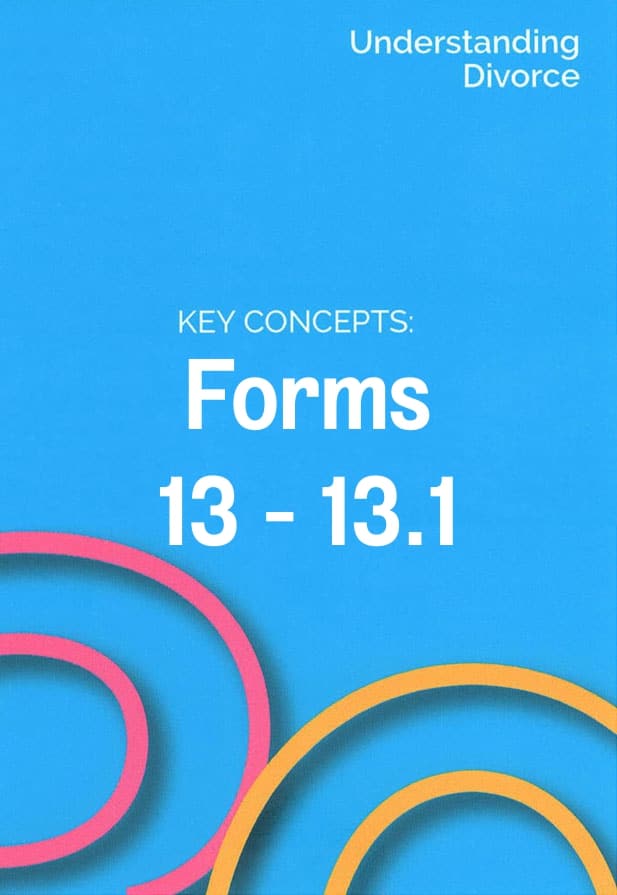Unlock Form 13.1 & Form 13 Made Easy Financial Statement
No, Ontario Family Court Form 13 and Form 13.1 are not the same. Here are the differences:
Form 13 – Financial Statement (Support Claims):
- Purpose: This form is used primarily for cases involving support claims, such as child support or spousal support.
- Content: It requires detailed information about income, expenses, assets, and debts.
- Usage: Typically used when only support issues are being addressed in the family law case.
Form 13.1 – Financial Statement (Property and Support Claims):
- Purpose: This form is used for cases involving both property and support claims.
- Content: It requires more detailed information compared to Form 13, including comprehensive details about property division, income, expenses, assets, and debts.
- Usage: Used when the case involves claims related to both support and property division.
In summary, Form 13 is used for support claims only, while Form 13.1 is used when both support and property claims are involved.
Not Just a Form, But a Financial Statement
Form 13 / 13.1 is not merely a form but an essential financial statement that plays a significant role in Ontario, Canada’s separation and divorce process. Here’s more about the pivotal role these documents play:
Overall, the Certified Financial Statement Form 13 and Form 13.1 are essential for ensuring that all financial aspects are considered and addressed in the divorce process, helping to establish a clear foundation for all involved parties to move forward.
Financial documents required include tax returns, pay stubs, bank statements, and records of all assets and debts
A complete divorce filing in Canada requires comprehensive financial documentation to ensure fair division of assets and support arrangements. Essential financial documents include:
- Last three years of tax returns and notices of assessment
- Recent pay stubs and employment records
- Bank statements from all accounts (past 12 months)
- Mortgage and property documentation
- Investment and retirement account statements
- Credit card and loan statements
- List of valuable personal property
- Business ownership documentation (if applicable)
These documents support the completion of Form 13.1: Financial Statement, which is a mandatory requirement for divorce proceedings involving support or property claims in most Canadian provinces.
Form 13 is a mandatory financial statement for support-related cases in Ontario family court
A Form 13 Financial Statement is a legal document specifically designed for cases involving child and spousal support in Ontario’s family court system. This essential form provides a detailed breakdown of an individual’s financial situation, focusing exclusively on income and expense information needed to calculate support payments.
- Required for all child and spousal support proceedings
- Focuses solely on income and monthly expenses
- Simpler than Form 13.1, which covers property division
- Must be completed with accurate, current financial information
Understanding the difference between Form 13 and Form 13.1 is crucial – while Form 13.1 covers comprehensive financial matters including property division, Form 13 deals strictly with support-related finances.
Complete a detailed financial statement using Form 13.1 or Form 13 to determine child support payments in Ontario
Filing a financial statement for child support requires careful documentation of your complete financial situation. The process involves selecting the correct form and providing accurate financial details to ensure fair support calculations.
- Use Form 13.1 for cases involving only child/spousal support
- Use Form 13 if your case also includes property division claims
- Document all income sources including salary, investments, and benefits
- List monthly expenses related to children including:
- Housing and utilities
- Medical and dental costs
- Educational expenses
- Extracurricular activities
- Attach supporting documents like pay stubs, tax returns, and expense receipts
Ensure all information is accurate and current, as these details directly impact the calculation of child support payments under the Federal Child Support Guidelines.
Ken Maynard CDFA, Acc.FM
I assist intelligent and successful couples in navigating the Divorce Industrial Complex by crafting rapid, custom separation agreements that pave the way for a smooth transition towards a secure future. This efficient process is achieved in about four meetings, effectively sidestepping the excessive conflicts, confusion, and costs commonly linked to legal proceedings. Clients have the flexibility to collaborate with me either via video conference or in-person through a DTSW associate at any of our six Greater Toronto mediation centers, located in Aurora, Barrie, North York, Vaughan, Mississauga, and Scarborough.




 If you have decided to proceed with your divorce, you may be expected to file a Financial Statement and
If you have decided to proceed with your divorce, you may be expected to file a Financial Statement and 











































